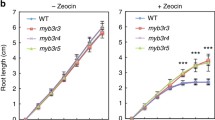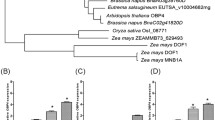Abstract.
The Arabidopsis thaliana (L.) Heynh. gene PROLIFERA (PRL) is a member of the MCM family of genes that are required for DNA replication during the S phase of the cell cycle. PRL is expressed in dividing cells throughout plant development. During reproductive development, PRL is expressed in both the developing megaspore mother cells and microspore mother cells, but is not expressed in the developing microgametophyte, suggesting that it does not function in the final haploid divisions leading to the production of a mature pollen grain. Disruption of PRL leads to megagametophyte and embryo lethality. prl mutant embryos arrest at a variety of stages, and often show defects in cytokinesis. Multinucleate cells and non-stereotypical cell division planes are commonly observed in developing prl mutant embryos, although mcm mutations in other organisms have not been reported to affect cytokinesis. These observations suggest that PRL may play a role in cytokinesis that is distinct from its role in regulating DNA replication. Additionally, a novel cytokinesis checkpoint that monitors cell cycle progression may exist in Arabidopsis.
Similar content being viewed by others

Author information
Authors and Affiliations
Additional information
Electronic Publication
Rights and permissions
About this article
Cite this article
Holding, D.R., Springer, P.S. The Arabidopsis gene PROLIFERA is required for proper cytokinesis during seed development. Planta 214, 373–382 (2002). https://doi.org/10.1007/s00425-001-0686-0
Received:
Accepted:
Published:
Issue Date:
DOI: https://doi.org/10.1007/s00425-001-0686-0



